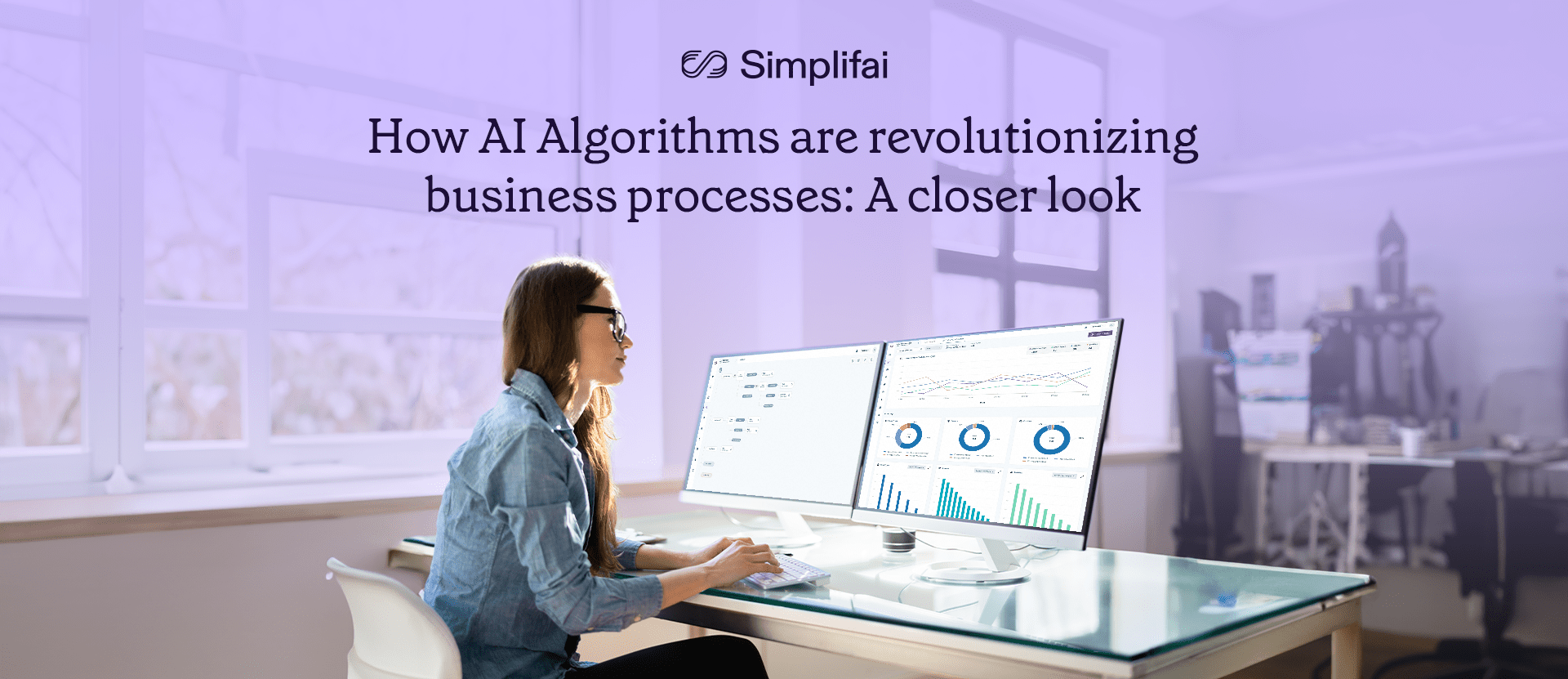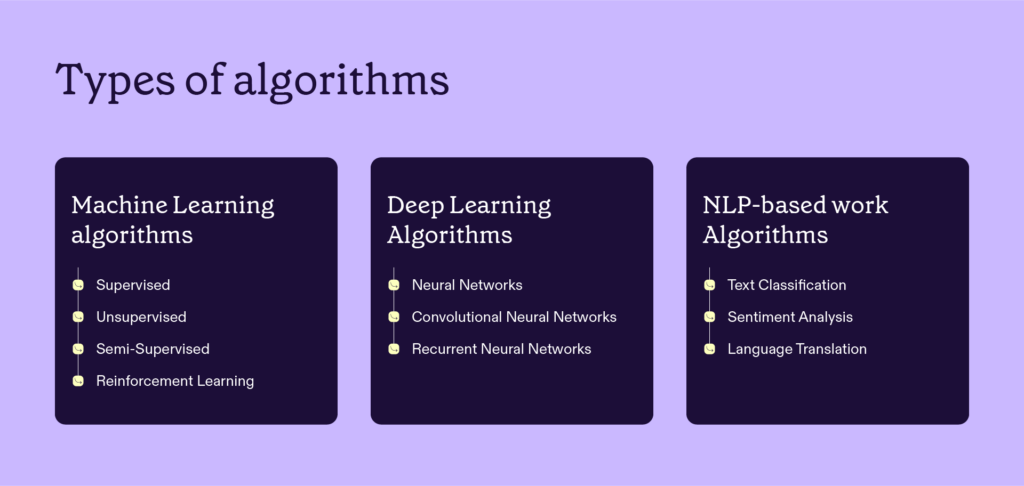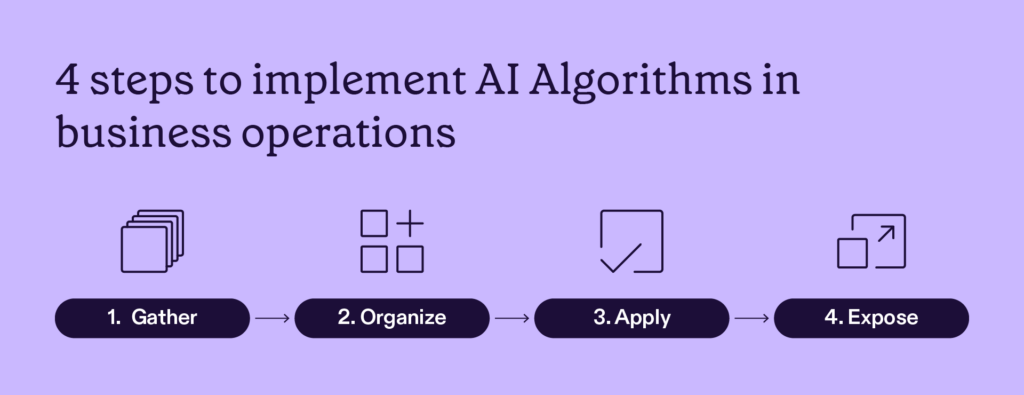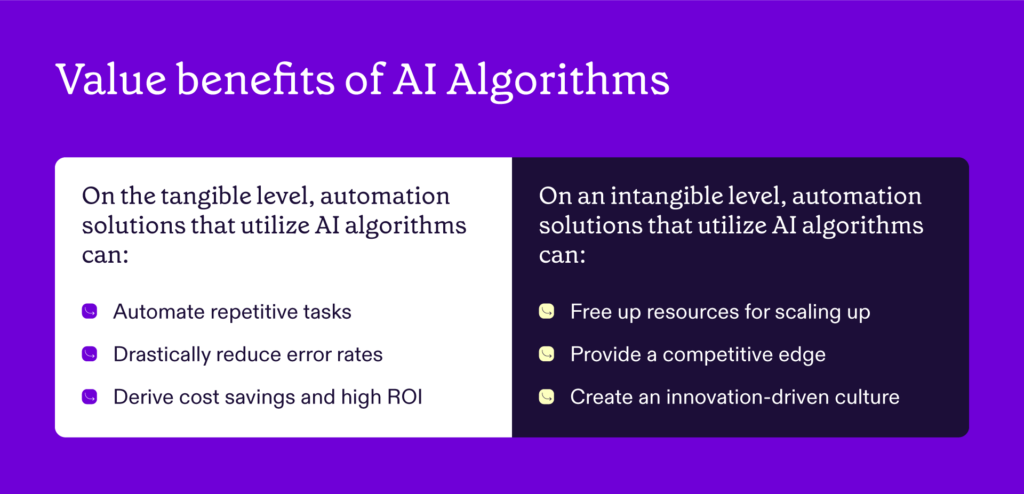Harnessing the power of AI Algorithms for strategic business growth
In today’s rapidly evolving digital landscape, AI for business has become a cornerstone for innovation and growth. From tech giants to startups, businesses across the spectrum are employing AI to gain a competitive edge. AI algorithms, the underlying mechanisms that enable machines to learn, predict, and problem-solve, have now taken center stage.

For business leaders and entrepreneurs, AI algorithms can unlock vast potential and drive significant business transformation in several industries, while unlocking new revenue streams. To ensure that organizations do not lack in this path of progress, it is vital for businesses to understand the different types of AI algorithms and how they can be leveraged for optimal performance efficiency.
On this note, our latest blog dives deep into the world of AI algorithms and how businesses can harness their power to gain strategic growth and other value benefits.
AI Algorithms – The building blocks of business innovation
AI algorithms are automated computational procedures designed to solve complex problems in business operations, make informed decisions, and predict outcomes based on available data. They can learn over time and allow daily work processes to evolve and effectively help businesses serve their customers better.
Pros of AI Algorithms
- Automation of routine tasks
- Advanced data analysis
- Improved decision making
- Enhanced customer experience
Cons of AI Algorithms
- Implementation costs
- Dependence on data
- Ethical considerations
- Security and privacy concerns

Impact of automation solutions and different industries and associated business growth
In sectors like Banking and Financial Services sector, AI algorithms streamline card management, account servicing, and data verification, among others. The Insurance industry benefits from these algorithms in claims processing and underwriting risk assessments when implemented via AI-powered solutions such as email and document processing. In both these industries, the algorithms are able to analyze and interpret large volumes of data through AI automation and correctly answer customer inquiries, thus saving time and improving customer satisfaction.
Beyond these sectors, AI algorithms also enhance public data accessibility in the Public Sector. This not only boosts public trust and transparency but also leads to improved customer service, cost reduction, and increased customer satisfaction. This is possible as algorithms and their predictive capabilities enable the solutions to correctly analyze and interpret public inquiries and carry out relevant actions and responses as per the algorithm calculations.
In the Logistics and Telecom industries, key use cases for daily operation include route optimization and customer predictions, leading to overall improved customer service with reduced operational costs.



Incorporating AI Algorithms to reshape business operations
Based on the problems identified, the AI technology chosen, and the medium of implementation such as AI-based business automation solutions, the algorithms utilized will differ. However, the process to implement them remains consistent regardless of the application.

1. Gather
This step begins with procuring data through data security and compliant processes that should adhere to global laws and regulations.
2. Organize
Next comes the part of organizing the data through a process called ETL (extract, transform, and load) for training purposes.
3. Apply
Once the data has been organized and refined, use Machine Learning and Deep Learning tools to extract insights, identify trends, and train the algorithms.
4. Expose
The final step is to use the insights and other important information gathered to facilitate business operations smoothly and effectively, thus providing value generation for the end customer.
Value generation and value potential derived from AI Algorithms
The integration of AI algorithms in business operations can generate substantial value, both tangible and intangible. However, it should be noted that the business values and benefits can vary based on the business operations being processed through AI. Here are some broad-level business values that can be achieved:

This helps with improved decision-making, facilitated by precise data-driven insights, ultimately enhancing customer experience and driving revenue growth.
AI algorithms thus contribute to enhanced operational efficiency, and employee satisfaction, and help maintain a strong brand image.
In addition to the above, one of the most significant business benefits of AI algorithms is that they reduce errors and maintain overall growth and scalability in organizations. This is important to note as errors and often caused to due to human biases which are as follows:

Future implications and conclusion
As we look ahead, AI for business and related automation is set to become even more integral to business operations. Companies that fail to embrace these technologies risk falling behind. As a C-level executive, now is the time to start your AI journey, foster an AI-first culture, and seek partnerships and collaborations for AI adoption.
Ultimately, AI algorithms can offer more than just business transformation; they can provide a strategic advantage in an increasingly competitive marketplace. By understanding and harnessing the power of these algorithms, business leaders can drive growth, streamline operations, and deliver superior customer experiences.


